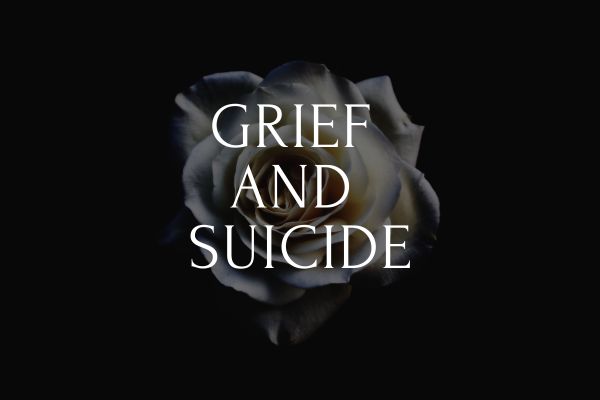Coping when someone dies by suicide
If you are reading this, then it may be that you are trying to cope after the death of someone close to you by suicide. I am so sorry for your loss. Below are some tips to help you cope. But, remember, professional help can really come in useful at this time. So, if you need help coping with your loss, please do contact a counsellor or therapist.
- Allow Yourself to Grieve:
Grieving is a natural and necessary process. Give yourself permission to feel a range of emotions, including sadness, anger, guilt, and confusion. It’s okay to experience a mix of emotions. - Seek Support:
Reach out to friends, family, or a mental health professional who can provide understanding and support. Sharing your feelings with others can be a crucial part of healing. - Join a Support Group:
Connecting with others who have experienced a similar loss can be comforting. Support groups provide a space where people can share their stories, thoughts, and feelings without judgment. - Take Care of Your Physical Health:
Grieving can take a toll on your physical well-being. Make sure to eat healthily, get enough sleep, and engage in regular physical activity. Taking care of your body can contribute to your overall resilience. - Consider Professional Help:
If you find it difficult to cope with the grief on your own, consider seeking the help of a therapist or counsellor. They can provide guidance and support tailored to your specific needs. - Educate Yourself:
Understanding suicide and mental health issues can help you make sense of the situation. Learning about the factors that contribute to suicide and the warning signs might bring some clarity, though it won’t remove the pain. - Create a Memorial:
Celebrate the life of your loved one by creating a memorial or tribute. This could be a physical memorial, like planting a tree or creating a scrapbook, or a virtual one, such as a memorial website or social media page. - Set Realistic Expectations:
Grieving is a process that takes time, and healing doesn’t happen overnight. Be patient with yourself and recognize that it’s okay to feel a range of emotions over an extended period. - Find Meaning:
Seek ways to find meaning in the loss. This might involve participating in advocacy for mental health awareness or contributing to a cause that was important to your loved one. - Take Breaks:
Grieving can be exhausting. Take breaks when you need them. Engage in activities that bring you comfort and joy, even if it’s just for short periods.
How to recognise signs of someone who is suicidal
Recognizing the signs that someone may be suicidal can be challenging, as people often hide their feelings or may not express them directly. However, there are certain behaviours and warning signs that may indicate someone is struggling and in need of help. Keep in mind that these signs are not definitive, and individuals may exhibit different symptoms. If you’re concerned about someone, it’s important to take any signs seriously and seek professional help.
Here are some common signs to look for:
- Talking about Suicide:
They may express feelings of hopelessness, unbearable pain, or that they have no reason to live. They might talk about wanting to die or expressing a desire to end their life. - Withdrawal:
A sudden withdrawal from friends, family, and activities they once enjoyed can be a warning sign. They may isolate themselves and avoid social interactions. - Changes in Behaviour:
Noticeable changes in behaviour, mood, or personality can be indicative of distress. This may include increased irritability, agitation, recklessness, or drastic mood swings. - Giving Away Possessions:
Some individuals who are contemplating suicide may give away their belongings or make statements indicating they won’t be needing them. - Sudden Improvement:
While it might seem counterintuitive, a sudden improvement in mood or behaviour may be a sign that someone has made a decision to end their life. This could be because they feel a sense of relief after deciding on a course of action. - Self-Harm:
Engaging in self-harming behaviours, such as cutting or burning, may be an indication of emotional pain that could escalate to suicidal thoughts. - Substance Abuse:
An increase in drug or alcohol use, especially if it’s out of character, can be a sign that someone is struggling to cope. - Sleep Changes:
Significant changes in sleep patterns, whether it’s insomnia or excessive sleeping, may be a sign of emotional distress. - Expressions of Feeling Trapped:
Feeling trapped or having no way out of a situation may contribute to suicidal thoughts. They may believe they have no options or solutions. - Drastic Mood Swings:
Extreme mood swings, particularly if there is a shift from deep despair to sudden calmness, may be a cause for concern.
It’s crucial to approach the person with empathy, express your concern, and encourage them to seek professional help. If you believe someone is in immediate danger, don’t leave them alone. Call emergency services or take them to the nearest emergency room. Remember that recognizing the signs is just the first step. Encourage the person to talk to a mental health professional or a trusted individual in their life who can provide support.

